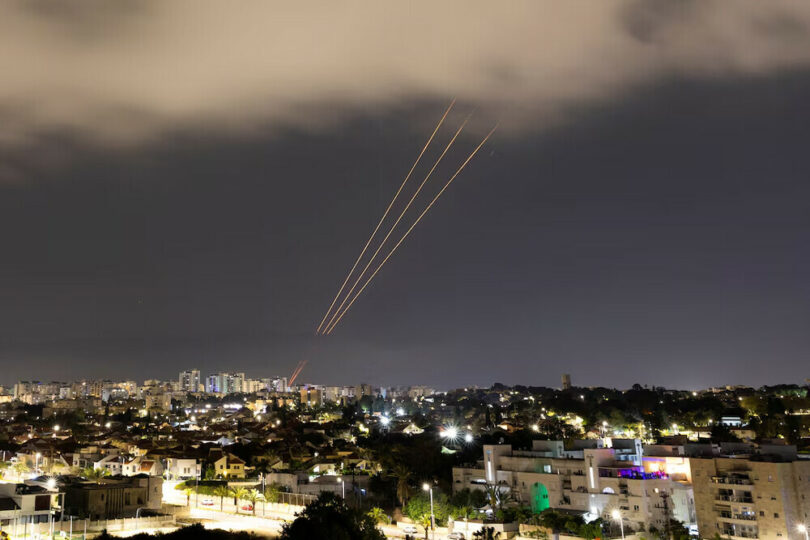Palwasha Aftab
Iran launched its first-ever direct assault on Israeli territory late on Saturday in retaliation for a deadly Damascus strike, marking a major escalation of the long-running covert war between the regional foes. Tehran’s retaliatory strikes against Israel were less about inflicting substantial damage on Israel but more about restoring deterrence and sending a strong message to Tel Aviv that it had the capability to take such an action in self-defense in accordance with UN Charter’s Article 51.
Tehran’s actions were prompted by Israel’s attack on its consulate in Damascus in which seven of its military advisers, including three senior commanders serving in Syria, were killed, marking a major escalation in Israel’s conflict with Iran. On that occasion, major world powers avoided unequivocally condemning the attack and censuring Israel for its recklessness; the UN Security Council didn’t condemn the Israeli move either after US, Britain and France opposed a condemnation statement drafted by Russia.
The reaction from Pakistan’s Foreign Office also contained a reference to the Damascus consulate attack as the trigger for Iranian action against Israel. This episode has sparked fears of a full-blown regional war, which if not de-escalated timely, may have ripple effects on Pakistan, endangering its security and economic interests linked with Iran.
Ties between Iran and Pakistan have been functional, and in periods warm, but ultimately not particularly strong. Traditionally, Iran has had a negative perception of Pakistan due to its strong relations with geopolitical forces opposed to Iran: the United States and Gulf powers, especially the United Arab Emirates and Saudi Arabia.
For Pakistan’s part, it has seen Iran as a difficult and not very useful neighbor due to its pariah status in the West. Iran has also had a closer relationship with Pakistan’s archrival India, and Pakistani leaders have accused Iran with credible evidences of supporting and providing haven to anti-Pakistan ethno-nationalist groups.
Currently, keeping in view the Middle East’s volatile situation, Pakistan fears that Iran could mobilize its proxies, like the Zainebiyoun Brigade in Pakistan, to wage a protracted proxy war against Israel and its interests across the Middle East. Furthermore, following the Iran-Pakistan tensions in January, the latter also feared that Iran could use the Zainebiyoun Brigade as a proxy against Pakistan for being a “Major Non-NATO Ally” (MNNA) of the US and so, to plunge Pakistan into sectarian tensions. Expectedly, in January, Pakistan decided in principle to add the Zainebiyoun Brigade to the National Counter Terrorism Authority (NACTA)’s list of proscribed organizations. The decision was implemented on March 29 and publicized on April 11.
Before this, Pakistan has also banned two obscure Iran-supported Shia militant outfits, Ansar-ul-Hussain and its offshoot, Khatam-ul-Anbia, under the Anti-Terrorism Act (ATA) 1997 in 2016 and 2020, respectively, for recruiting Pakistani Shias to fight in Syria. In short, Pakistan’s ban on the Zainebiyoun Brigade, in view of its potential use as an Iranian proxy against Israel and Pakistan, has the potential to further strain the already tense Pak-Iran ties amid a rapidly deteriorating situation in the Middle East.
Meanwhile, it is also true that hostile third countries would like to see a permanent break in Pakistan-Iran ties. Reportedly, Iran’s Islamic Revolutionary Guard Corps (IRGC) has a fraction of elements within who act like mercenaries, raising the spectre for triggering a protracted three-front dilemma, involving Afghanistan, India and Iran, for Pakistan.
Leaders in both capitals must ensure this does not happen. Apart from the security sphere, the Middle East heat can also jeopardize Islamabad’s economic interests, particularly its endeavors to complete the multibillion-dollar Pak-Iran gas pipeline project which can address its energy shortage crisis and ward off $18bn potential penalties from Tehran. Washington has already said that it does not support the gas pipeline project from going forward and cautioned about the risk of sanctions in doing business with Tehran. In these challenging times, domestically, it is crucial for the political leaders of Pakistan to restore political stability and provide unwavering support to our Armed Forces, who stand as the bulwark of national security, to prevent the ongoing regional conflict from destabilizing Pakistan.
Internationally, as a country in the region, Pakistan desires a peaceful neighborhood. It has an interest in containing the hostilities in Middle East that have the potential to engulf the entire region. Ever since the start of the war on Gaza by the Israeli occupation forces, Pakistan has underlined the necessity of international efforts to prevent the expansion of hostilities in the region and for a ceasefire in Gaza. Pakistan has also condemned Israeli aggression against Syria and Lebaonon. The actions taken by Israel in the coming days, along with the effectiveness of international diplomatic interventions, will be critical in shaping the next phase of this increasingly complex geopolitical theatre.
No wonder, de-escalation is pressing need of the hour, the path for which is clear. Israel must immediately end the slaughter in Gaza, which is the key driver of the current confrontation in the Middle East. Moreover, it must cease its roguish acts of targeting sovereign states including Iran, Lebanon and Syria. The UN Security Council should send a similar message to Israel and its backers.







